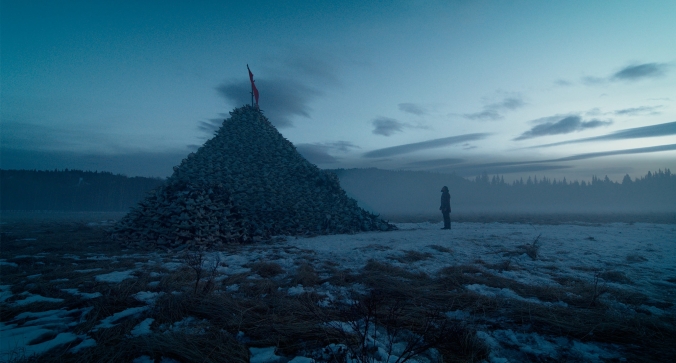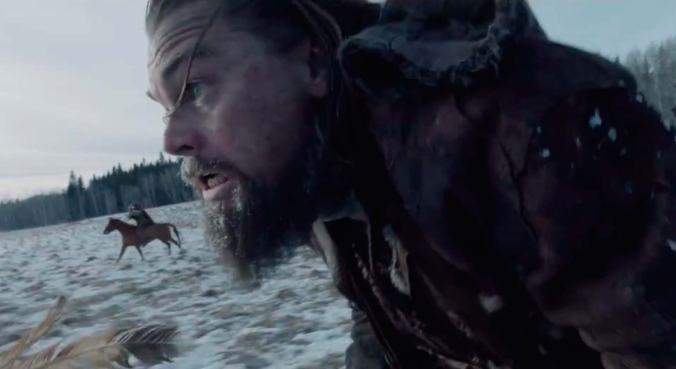I was having a conversation with a friend earlier today, talking about actors more deserving of an Oscar than Leo that no one seems to recognize with the same kind of vigor. Actors like Edward Norton, Glenn Close, Joaquin Phoenix, Robert Redford, Bill Murray, Gary Oldman, Brad Pitt, Johnny Depp, and Ed Harris.

I think it could be said that any of these guys really deserve an Oscar as much as Leonardo, and in a few cases, yeah, a lot more than he does. But a lot of these actors don’t really do a ton of Oscar films. Some of them have just had really bad luck as the years go. And most importantly, none of them seem to care quite as much as DiCaprio does. Of course, who knows if that’s a pop culture construct? Maybe Leo is too busy counting his money to care, and we just put it on him.
And this attitude, be it projected on Leo or not, is symptomatic of everything really wrong with the Revenant, a meticulously crafted film, that is in Leo’s case, an odyssey of what one man would do to win an Oscar, and in the case of Director Alejandro G. Inarritu and team, a rod to make lightning strike twice.
Lightning doesn’t, in what turns out to be a film off brooding, oddly prosaic intensity.
Leonardo DiCaprio plays Hugh Glass, a frontiersman left for dead after he’s mauled by a bear and his son is killed by one of their hunting party. Embarking on a journey of revenge against the men who wronged him, Hugh traverses the hostile frontier, and this is the movie.
And it’s a beautiful film. Undeniably one of the most beautiful films ever made. Shot entirely on location, using entirely natural light by Emmanuel Lubezki, the camera dances around the wilderness and turn the ugliness beautiful with a sensibility of violent ballet. There’s Lubezki’s trademark long take aesthetic, his remarkable use of steadicam, his eye for natural detail. It’s perhaps the strongest thing about the Revenant, and in a film where everyone involved seems to be gunning for repeat awards glory. There’s some really incredible CGI in the bear, a massive herd of bison, and I’m sure in many places I would never even notice.
Where the issues start to creep in are in the direction. Innaritu, a director known for bleak, heavy drama (Birdman is the odd man out in his ouevre) fires on all cylinders for bringing in the bleak and the heavy, but loses out on drama.

It can really be chalked up to a question of thematics. For all it’s visual flourish, The Revenant really is just a simple revenge tale, and that seems unsatisfactory to its director. Whether it’s heavy handed soapboxing (“You talk to us about honor?” sneers one Indian in French to a Fur Trader who accuses him of theft) or moments of reflection that impede the film as it churns to its final showdown, what the film is trying to say just can’t be sustained by what’s there.
In the wake of Leo’s white savior proselytizing at the Golden Globes and what meager thematics the film has to offer, I’m sure there’s a greater sense of theme, somewhere in there. There’s something to be said about man’s relationship with nature, or the universe, or something. But make no excuses, The Revenant is a chase film. It’s a revenge film. It’s a simple story made by a director that seems to not understand, that you can’t direct beyond the page. It’s like it’s some sort of exercise in trying to turn a genre film into one that is great, and full of theme, and that purports to say something, but it falls flat. It doesn’t have the colonial angst of Apocalypse Now. It doesn’t even have the manly deconstruction of The Grey.
No, the best comparison to make for The Revenant is another bear movie, the Alec Baldwin/Anthony Hopkin whammy that is 1997’s The Edge.
Of course, Leo and Tom Hardy present a better acting duo than the aforementioned pair, although Tom Hardy stands out as being maybe the only actor in the film to understand exactly what kind of movie he’s in. He plays a villain that is complex enough, that is believable, and just despicable enough, chewing into the meat of the role with a kind of enthusiasm that plays pretty well as a foil to Leo’s whirlwind of self abuse and grunting.
That isn’t to say it’s a bad movie. It’s a breathless, furious film that pushes on all cylinders, purely on its craftsmanship. But if every scene is nearly perfect, the film as a whole leaves a ton to be desired. Come for the splendor, but don’t stick around for meaning.